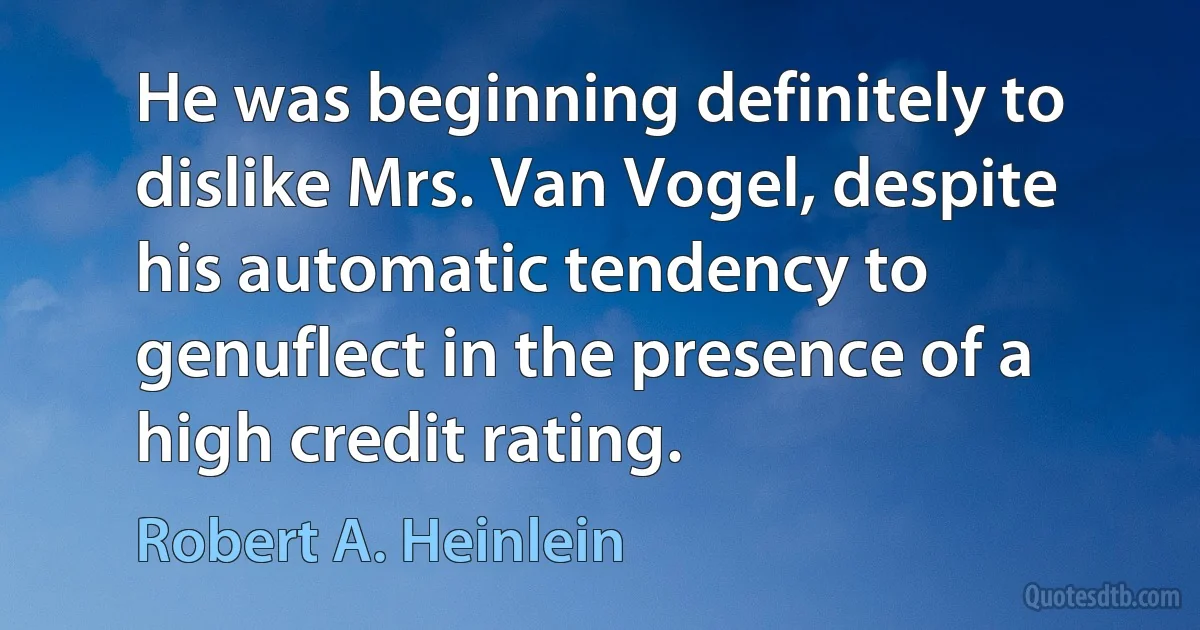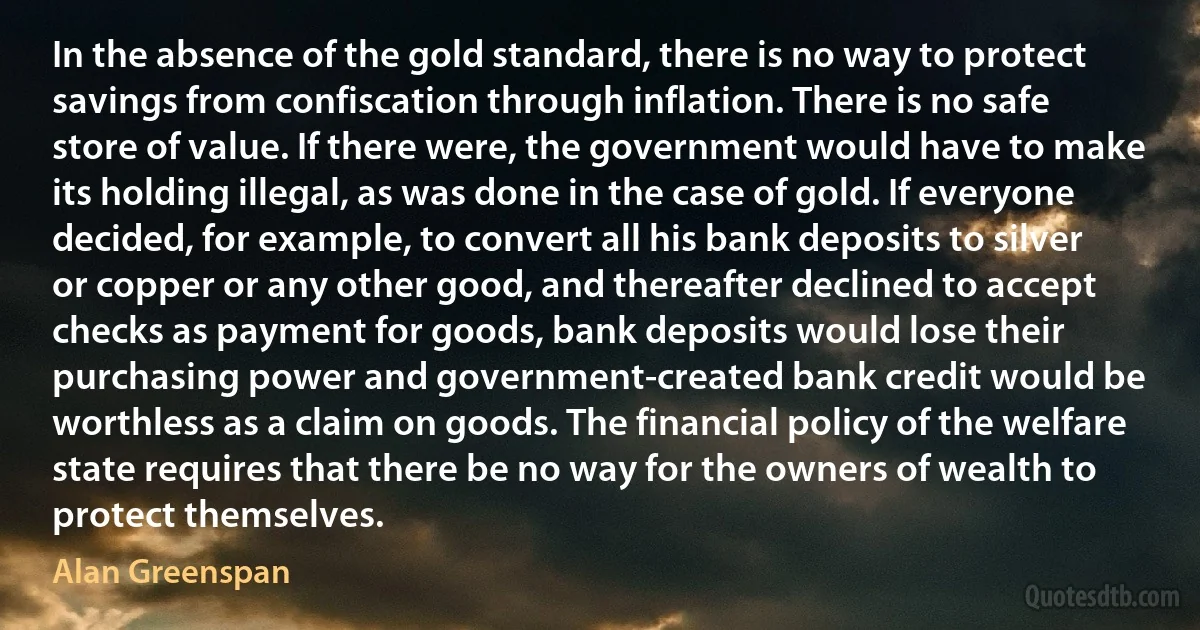Credit Quotes - page 37
The story of Christ has not one trait, either in its character, or in the means employed, that bears the least resemblance to the power and wisdom of God, as demonstrated in the creation of the universe. All the means are human means, slow, uncertain, and inadequate to the accomplishment of the end proposed; and therefore the whole is a fabulous invention, and undeserving of credit.

Thomas Paine
The issue was whether they were going to maintain our present economic structure, with improvements ameliorating its asperities gradually and cautiously, or whether they were going to pull the whole thing down, to put the whole of our commerce and industry into the melting-pot, at a moment when everything depended on credit and confidence, and absolutely destroy these things by committing the country to a wild series of proposals. Put compendiously, the proposal of the Labour Party was, "The nation is suffering from lack of capital; let us take what there is." (Laughter.) The old idea of bleeding a patient, abandoned by the medical profession, was taken up by the Labour Party. Even the doctors never bled a patient who was suffering from anaemia, yet that was what the Labour Party proposed. It was the stupidest programme ever put before the electorate.

David Lloyd George
I wish I had a flair for writing, as then I am certain this regiment would get the credit due them when the history of this operation is finally written. Now everyone knows, but in a few years what is written will govern. I will do a better job of getting the facts in my reports than I did in the past war. I will also claim everything due the regiment.

Chesty Puller
When things go badly, it is your fault, not theirs. You are responsible. Analyze how it happened, make the necessary fixes, and move on. No mass punishments or floggings. Fire people if you need to, train harder, insist on a higher level of performance, give halftime rants if that shakes a group up. But never forget that failure is your responsibility. Share the credit, take the blame, and quietly find out and fix things that went wrong. A psychotherapist who owned a school for severely troubled kids had a rule: "Whenever you place the cause of one of your actions outside yourself, it's an excuse and not a reason." This rule works for everybody, but it works especially for leaders.

Colin Powell
A more specifically religious indication is that Master Tara Singh, the acknowledged leader of the Sikhs since at least the eve of Partition, was a cofounder of the Vishva Hindu Parishad in 1964.(...) Even Khushwant Singh admitted that RSS and BJP activists had saved many Sikhs while Congress secularists were killing them: "It was the Congress leaders who instigated mobs in 1984 and got more than 3000 people killed. I must give due credit to RSS and the BJP for showing courage and protecting helpless Sikhs during those difficult days. No less a person than Atal Bihari Vajpayee himself intervened at a couple of places to help poor taxi drivers.” Ch. 8.

Koenraad Elst
GDP! The right concept of economy-wide output, accurately measured. The U.S. and the world rely on it to tell where we are in the business cycle and to estimate long-run growth. It is the centerpiece of an elaborate and indispensable system of social accounting, the national income and product accounts. This is surely the signal innovative achievement of the Commerce Department in the 20th century. I was fortunate to become an economist in the 1930's when Kuznets, Nathan, Gilbert, and Jaszi were creating this most important set of economic time series. In economic theory, macroeconomics was just beginning at the same time. Complementary, these two innovations deserve much credit for the improved performance of the economy in the second half of the century.

Simon Kuznets
It is to Gainsborough's credit that he never attempted the so-called 'grand style' in painting as did Romney with such doubtful success; in that province Reynolds holds the highest rank of the artists of his day. Gainsborough in some respects was like a child; and this gives his character a certain attraction.

Thomas Gainsborough
... but I am under no apprehension of a capital injury from any other source than that of the continual depreciation of our Money.
This indeed is truly alarming, and of so serious a nature that every other effort is in vain unless something can be done to restore its credit.
..
Where this has been the policy (in Connecticut for instance) the prices of every article have fallen and the money consequently is in demand; but in the other States you can scarce get a single thing for it, and yet it is with-held from the public by speculators, while every thing that can be useful to the public is engrossed by this tribe of black gentry, who work more effectually against us that the enemys Arms; and are a hundd. times more dangerous to our liberties and the great cause we are engaged in.

George Washington
People didn't give us credit for being as good as we were last season. Personally, I think we won because we had the best team in the league. Some guys talked about all the stars on the other teams, and they quote statistics to show other teams were better. Let's talk about statistics. The important statistics in basketball are supposed to be points scored, rebounds and assists. But nobody keeps statistics on other important things - the good fake you make that helps your teammate score; the bad pass you force the other team to make; the good long pass you make that sets up another pass that sets up another pass that leads to a score; the way you recognize when one of your teammates has a hot hand that night and you give up your own shot so he can take it. All of those things. Those were some of the things we excelled in that you won't find in the statistics. There was only one statistic that was important to us - won and lost.

Bill Russell
In 1993 in Mogadishu, Somalia, I was the Delta Force commander during the events most commonly referred to as "Black Hawk Down." Two Black Hawk helicopters were shot down in the city of five million people, where most of those people were starving refugees. Within thirty minutes of the first chopper being shot down, the second one was shot down. When the first chopper went down I sent every one of my soldiers who were already fighting in the city to go rescue the crew and passengers of the first crash. I was left with few options when the second helo went down over a mile away from the first crash. I had to pull together a second rescue effort using those soldiers, sailors, and airmen who were left in the base- many of whom were not combat arms specialties (they were clerks, mechanics, communicators, and supply people). To their credit, every man was eager to be part of the effort to rescue their brothers at the second crash site.

William G. Boykin
I want to say to all the young women out there: there will people along the way who will try to undercut your success or take credit for your accomplishments or your fame, but if you just focus on the work and you don't let those people sidetrack you, someday when you get where you're going you'll look around and you'll know that it was you and the people who love you who put you there, and that will be the greatest feeling in the world.

Taylor Swift
The elaborate financial interdependence of the modern world has grown up in spite of ourselves. Men are fundamentally just as disposed as they were at any time to take wealth that does not belong to them. But their relative interest in the matter has changed.
In very primitive conditions robbery is a moderately profitable enterprise. Where the rewards of labor are small and uncertain, and where all wealth is portable, the size of a man's wealth depends a good deal on the size of his club and the agility with which he wields it. But to the man whose wealth so largely depends upon his credit, dishonesty has become as precarious and profitless as honest toil was in more primitive times. The instincts of the City man may at bottom be just as predatory as those of the robber baron, but taking property by force has been rendered impossible by the force of commercial events.

Norman Angell
We have introduced the monetary factor not by necessity but by choice. Its advantages are obvious. Self-financed commodity units are not only interest free, but free also from dependence upon credit conditions. They are a step-desirable, it seems to us-in the direction of a goods economy as distinct from a money economy; but this step is taken without violence by merely identifying basic goods with money. It guarantees unfailing purchasing power where it is most needed-among the countless producers of raw commodities.

Benjamin Graham
If you believe in the... War in Heaven where a third of the angels were cast out... it was about man's choice and he would provide a saviour and Satan's plan was... I'll save everybody... just take away their choice and give me the credit...that plan was rejected... because God knew that...failure was important ...the progressives have... replaced God... they are taking.... rights are not given to us by our creator, they created by congress, they are taking the role of God, and so they are taking away our suffering, they are taking away all of our pain, all of the opportunity to fail...

Glenn Beck
As a matter of hard, dry fact, from which there can be no getting away, there is more Labour legislation standing to the credit account of the Conservative Party on the Statute Books than there is to that of their opponents. It is a grotesque assumption that one side exists for the purpose of passing such legislation while the other does so grudgingly and under the force of compulsion.

Keir Hardie
During the years Hardie was in Parliament, from 1892 to 1895...he made the subject of unemployment an issue in British politics. Before then the State acknowledged no obligation to make provision for the unemployed. They were regarded as being in the main a lot of drunken, thriftless, ne'er-do-wells whose condition was due to their own fault. By persistently keeping the unemployed question before Parliament, and by speaking at week-ends throughout the country, Hardie at last succeeded in getting the Government to admit a public responsibility for the unemployed. To Keir Hardie, more than to any other man, the credit was due for the great change which, in the last 30 years, had come over Parliament, and the awakening of the public conscience on this question.

Keir Hardie
Within the next year they are spending millions of dollars to destroy the United Farm Workers. They are spending millions of dollars to tell what a bad administrator César Chávez is. Have you seen these articles in the New York Times and Time magazine? They say César Chávez is a bad administrator. What they really mean is he is the wrong color. And if he were a good administrator.... Can you imagine five clinics, a medical plan, a credit union, a retirement center for farm workers, fantastic increases in wages, the removal of the labor contract system-all of this César did in a few short years. What would he do if he was a good administrator?

Cesar Chavez



